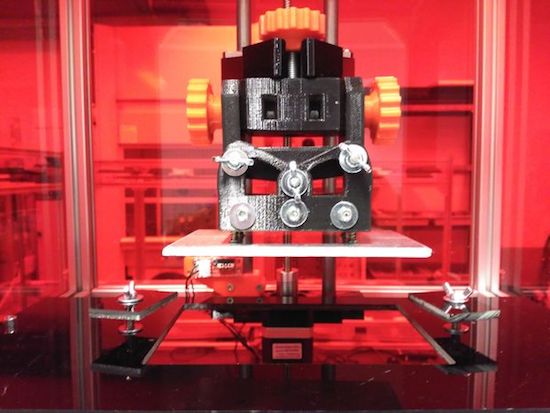![]()
Aldric Negrier, a Portuguese Maker and owner of RepRap Algarve, has created an SLA 3D printer named RooBee One.
Most desktop 3D printers that you’ll see in Makerspaces or advertised for home use drop material onto a bed using a hot extrusion head. The open-source RooBee One, however, employs a DLP projector along with an Arduino Mega to light up each layer in a vat of resin. This causes each layer to solidify, thus making a complete object. You can see this process at around 0:30 in the video below.
RooBee One features an aluminum frame with an adjustable print area of 80x60x200 mm, with up to a 150x105x200mm build volume. Aside from the Arduino, additional electronics consist of a RAMPS 1.4 shield, a NEMA 17 stepper motor, a microstepping driver, an endstop, and a 12V transformer. Negrier also installed a fan on top of the printer to help guide the toxic vapors outside and away from the machine’s operator.
This process may be unfamiliar to those used to “normal” 3D printers, as it “magically” pulls a complete part out of a bath. The project is fairly involved, but the resulting ruby-red machine looks quite impressive. You can find out how to build one on its Instructables page.
This entry was posted by Arduino Team on Monday, January 2nd, 2017 and is filed under 3D Printing, Arduino, Featured, Mega. You can follow any responses to this entry through the RSS 2.0 feed.
You can leave a response, or trackback from your own site.
You must be logged in with your Arduino account to post a comment.
How to control Arduino board using an Android phone
Arduino IDE 1.6 is released! Download it now
DIY less-expensive Thermal imaging camera
Send in the clones
My open-source, do-it-yourself cellphone (built with Arduino).
Welcome Arduino Yún – the first board combining Arduino with Linux
A low-cost robotic hand (tutorial) mirroring your own fingers
Microsoft and Arduino: new partnership announced today
Nice drawings of the Arduino UNO and Mega 2560
Arduino IR Remote Control
David Cuartielles (Spanish)
MAKE: Blog’s Arduino archive
Tom Igoe’s PComp Site

